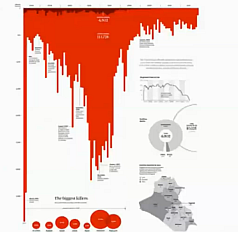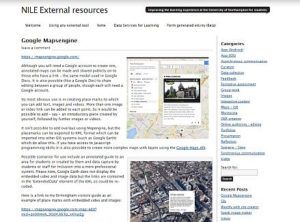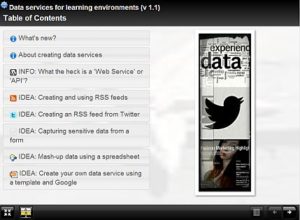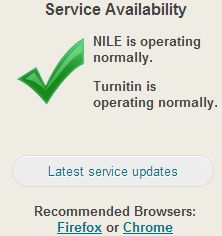The LearnTech team are:
Rob Howe – Head of Learning Technology
Rachel Maxwell / Rob Farmer / Julie Usher – Learning Designers
Rachel McCart – NILE Administrator
Adel Gordon – Learning Technologist (Science and Technology)
Geraldine Murphy – Learning Technologist (NBS)
Belinda Green – Learning Technologist (Education)
Iain Griffin – Learning Technologist – 0.8 (Health)
Al Holloway – Learning Technologist (Arts and Education)
Simon Thompson – Learning Technologist (Social Sciences)
Andy Stenhouse – Learning Technologist (Health)
Kieran McGovern – Learning Technologist 0.2 (No school alignment)
LearnTech Team - July 2014Front row (l-r) Rachel Maxwell, Geraldine Murphy, Belinda Green, Rachel McCart. Middle row (l-r) Adel Gordon, Julie Usher, Iain Griffin, Al Holloway, Andy Stenhouse. Back row (l-r) Rob Farmer, Rob Howe, Simon Thompson. Kieran McGovern - not available for photo.
The Learning Technology Team within Library and Learning Services has provided a number of tools to assist staff who wish to use video as part of their learning and teaching. These tools are simple to use and designed to enable staff to develop their own resources as required. The LearnTech team are not responsible for video production (filming and editing) for teaching purposes or for events.
The two key tools provided by the Learning Technology team are Panopto and Kaltura and these are promoted at regular training events or bespoke sessions can be setup for small groups depending on availability of staff and sufficient notice (at least one week). Requests should be directed towards the normal Learning Technologist for your School or via general email to the team.
If any staff wish to use these tools then they will need to ensure that they have the training and have assured themselves that the machines which they intend to use are setup correctly. (IT Services can assist with installations if needed).
If staff wish to contract to a supplier to do the filming / editing work then please contact production@northampton.ac.uk who will advise of the most appropriate next step depending on needs.
 Data Visualisation has become an important aspect of our lives and the ability to present data in interesting ways has always had a role in teaching and learning. On behalf of Tableau Software, Andy Kirk recently presented a fascinating overview of the challenges of Art vs Science in data presentation.
Data Visualisation has become an important aspect of our lives and the ability to present data in interesting ways has always had a role in teaching and learning. On behalf of Tableau Software, Andy Kirk recently presented a fascinating overview of the challenges of Art vs Science in data presentation.
The overall message is that the nature of the visualisation needs to be appropriate for its intent – is this exploring or explaining, thinking or feeling? So, for example, is a filter needed to explore the content or is a bold graphical statement required? 
Andy refers to his excellent web site visualisingdata.com during the presentation – the ‘resources‘ section contains a massive selection of applications that could be used, including a ‘Web’ section where most of the free online tools can be found. We have already experimented with some of these – Tableau Public and Infogram, for example – but there are many promising new ones such as Numberpicture that we hope to review as they become more polished. The ability to link to live data feeds as well as static data opens up a wide range of possibilities.
The video is a little long – around 50 minutes – and the sound is quite poor (it was a webcast after all), but is highly recommended for anyone considering creating infographics or visualisations themselves or asking students to submit assignments in this format.
Click here to launch the video (slides from the presentation – large file! 85mb)
We are pleased to announce the release of the new version of iNorthampton, currently available in the App and Play Stores. 
This release has addressed some of the feedback that we received about the app from staff and students, as well as it being built on a new development platform behind the scenes.
For those that have noticed that the old version hasn’t been updated for a while, this is the reason why – we’ve had to build it from scratch and re-visit the ways in which the data is pulled in from various institutional systems, which took much longer than anticipated.
So, the functionality remains similar to the previous version but with lots of new content. There are new Videos and Photos and updated locations and details in Maps like opening times and descriptions of shops and eateries on campus. As well as a new map of Northampton which contains points of local amenities like pharmacies and nightlife. Don’t forget that you can still use Augmented Reality on iPhone within the campus Maps.
 We have added the Tours feature, which will take you around both campuses allowing you to move around areas and buildings.
We have added the Tours feature, which will take you around both campuses allowing you to move around areas and buildings.
We are still working on the dedicated iPad version, which will make more use of the larger screen size of the iPad to give users a more scaled experience of the app and its features. We hope to go live with this over the next few months. In the meantime if you want to get iNorthampton on your iPad you can download the iPhone version by searching the App Store and choosing to search for iPhone rather than iPad apps.
We now plan to move forward with developing more features and functionality within the app. The library tool was the most requested feature for improvements, and the Library and Learning Services department are currently reviewing the Library Management System. The ability to renew books and check their account on mobile will be included in the new system and we will hopefully be able to make that available through iNorthampton.

We have collated the most common questions and answers below:
1) I can’t login to NILE
Please see details on the University Login page
Please first try to reset or generate a new password.
If your password has expired, you will still be able to log in to the user portal to reset this yourself.
If you have forgotten your password, please click on the above link and select ‘Forgot Password’.
If you continue to have log-in problems, please contact IT Services. You will need to have your student number to hand.
Email: ITServices@northampton.ac.uk
Phone: 01604 893333 (Monday to Friday 08:00 – 17:30)
Visit: Grendon Building, Park Campus (Monday to Friday 08:00 – 17:30)
2) I can login to NILE but cannot see my modules
In order to see the modules listed in the site box in NILE:
· You should have completed the enrolment process. Active enrolments are added to NILE every 20 minutes.
· You should be correctly enrolled on the module on the student record system. Contact your Student Administration Team to check enrolment details
· Your tutor needs to have made the module live on NILE.
3) I have modules listed but they are not the correct ones or some of my personal details are incorrect (e.g. name / email address).
Contact your Student Administration Team to check enrolment / personal details.
4) I cannot see my University timetable.
Your timetable should appear 48 hours after you have enrolled. If you have a timetabling query then email Timetabling@northampton.ac.uk
5) I have a problem with my laptop – in what ways can IT assist me?
IT will help you with installation of programs that are supporting your programme of study.
IT Services are more positioned to provide an overview and high level guidance on how to use standard office programmes however IT Services do not offer a formalised training programme to students. Please refer to free training advice and support.
IT Services will assist with any aspect of getting antivirus working on your machine or assistance with removing virus / malware or restoration to factory settings.
6) How and where do I print?
After enrolment it can take up to 24 hours for you to be emailed your University PIN which is required for printing and to access their library account.
- Using your student ID and PIN, you can credit up their student printing accounts at the machines in the library
- From computers in the library, print jobs are sent to all library photocopier printers
- To release a print job or to access a photocopier, it is:
- Student ID number (called PIN on the machines)
- 4 digit University PIN to print (called password on the machines)
7) How do I find out details about my student email and link this to my mobile device
You can get details of your email address by going to the University search4email page and then enter your username and date of birth. Please refer to the guidance provided by Microsoft on linking this email to your mobile device.
8) I have heard that there is a free offer for Microsoft Office
To download Microsoft Office 365 please visit the dedicated Microsoft site and login using your University email address and password.
 The latest roundup of LearnTech news is now available
The latest roundup of LearnTech news is now available
All sessions have now been mapped to the UK Professional Skills Framework as attendees may include these as evidence for Fellowship applications or ongoing professional development. The NILE Suite has been used to group related sessions together. Where relevant the events have also been mapped to the developing quality standards for NILE sites.
The list below represents the scheduled sessions however they can be run as a bespoke session for three or more staff at any mutually convenient time. All sessions will be run in the Park Library T-Pod (1st Floor) unless stated.
Menu of sessions available:
- Enhancing NILE content using Xerte
- Virtual Classrooms using WizIQ
- Enhancing NILE with media for asynchronous learners
- NILE – Grade Everything (Managing multiple elements in assessment. Marking presentations / live performances)
- The App Cafe
- SaGE Essentials
- SaGE – Providing quality feedback using rubrics
- Managing Groups (and group assignments)
- NILE Essentials – Making the most of your NILE site
- NILE – Encouraging collaboration and NILE interaction using Blogs, Discussion Boards, Journals and Wikis
- NILE – Developing formative assessments in NILE
- Making best use of smartboards
- Increasing in class session interaction using the voting handsets
SaGE Essentials
(Link to the UK PSF – A3, K4)
NILE Suite Alignment: Assessment
This essential session is for both staff who are new to the Submission and Grading Electronically (SaGE) Project and those who need a refresher on the current process. The event will cover the SaGE workflow including marking in Turnitin; passing grades to the NILE grade centre; downloading grades to send to the SATs; and working with the External Examiner. (12 places).
Attendance at this session will assist engagement with the Foundation Quality Standard for NILE sites.
Learning Outcomes:
- Understand the SaGE workflow
- Able to grade work
| Date (s) | Time |
| 20/10/14 | 2-4 |
| 21/10/14 | 2-4 |
| 22/10/14 | 10-12 |
| 23/10/14 | 2-4 (Note this is at Avenue) |
| 24/10/14 | 2-4 |
| 5/11/14 | 2-4 |
| 10/11/14 | 2-4 |
| 20/11/14 | 10-12 |
Register on: https://www.eventbrite.co.uk/e/sage-essentials-tickets-12952281623 for Park based sessions
Register on: https://www.eventbrite.co.uk/e/sage-essentials-tickets-12952410007 for the 23rd October at Avenue Library (MG8a)
SaGE – Providing quality feedback using rubrics
(Link to the UK PSF – A3, K4, V2)
NILE Suite Alignment: Assessment
A dedicated session for those who have already attended the SaGE Essentials session and are confident with the basic SaGE workflow. The event will focus on both Turnitin and NILE rubrics. Rubrics are useful for various styles of marking and can be used for qualitative and quantitative feedback. (12 places).
Learning outcomes:
- Able to setup and use rubrics
| Date (s) | Time |
| 6/11/14 | 10-12 |
Register on: https://www.eventbrite.co.uk/e/sage-providing-quality-feedback-using-rubrics-tickets-12952470187
Managing Groups (and group assignments)
(Link to the UK PSF – A3, K4, V1)
NILE Suite Alignment: Assessment / Collaboration
Regardless of the size of the cohort, the ability to manage groups is an important part of using NILE. Groups allow focused activity, assessment and communication which will enhance student engagement. In addition to learning about the setup and management of groups you will also focus on the NILE assignment submission area which may be used as an alternative to Turnitin submissions. (12 places).
Attendance at this session will assist engagement with the Collaboration Quality Standard for NILE sites.
Learning outcomes:
- Understand how to setup and organise groups
- Appreciate the range of functionality with groups
- Understand how the NILE assignment submission area may be used with groups
| Date (s) | Time |
| 14/11/14 | 2-4 |
Register on: https://www.eventbrite.co.uk/e/managing-groups-and-group-assignments-tickets-12952494259
NILE Essentials – Making the most of your NILE site
(Link to the UK PSF – A4, K4, V2)
NILE Suite Alignment: Content / Management
This session will introduce the NILE sites which are being used for all module and course areas. Find out the Top Ten most common mistakes with existing NILE sites and how to avoid them to improve the student experience. Attendees will develop confidence with working in their NILE area to add new and exciting content. (12 places).
Attendance at this session will assist engagement with the Foundation Quality Standard for NILE sites.
Learning Outcomes:
- Appreciate the range of NILE sites and comon student problems with finding content
- Reflect on your own NILE site based on areas for improvement
- Understand the range of tools to enhance NILE sites
| Date (s) | Time |
| 16/10/14 | 2-4 |
Register on: https://www.eventbrite.co.uk/e/nile-essentials-making-the-most-of-your-nile-site-tickets-12952514319
NILE – Encouraging collaboration and NILE interaction using Blogs, Discussion Boards, Journals and Wikis
(Link to the UK PSF – A2, K2, V1)
NILE Suite Alignment: Collaboration
This session will allow participants to explore the Blogs, Journals, Discussion Boards and Wikis tools inside NILE which encourage greater collaboration. (12 places).
Attendance at this session will assist engagement with the Collaboration Quality Standard for NILE sites.
Learning Outcomes:
- Understand the range of tools available to enhance collaboration within NILE sites
| Date (s) | Time |
| 28/10/14 | 2-4 |
NILE – Developing formative assessments in NILE
(Link to the UK PSF – A3, K4)
NILE Suite Alignment: Assessment
Formative assessment may be used by students to better track their progress and understanding. It may also be used by tutors to ensure that students are engaging and understanding the course material. This session will explore the test, survey and question pool tools within NILE. There is a range of functionality which provides the option of auto marked formative (and summative assessment) with question choices like multiple choice and fill in the blanks. These tools may be used with features such as adaptive release and the performance dashboard to allow greater student interaction with content and a higher level of tutor understanding of student engagement. (12 places).
Attendance at this session will assist engagement with the Participation Quality Standard for NILE sites.
Learning Outcomes:
- Understanding of the range and value of formative assessment
- Appreciate the tools which may be used within formative assessment
- Ability to implement range of appropriate tools within their own course
| Date (s) | Time |
| 17/11/14 | 2-4 |
Register on: https://www.eventbrite.co.uk/e/nile-developing-formative-assessments-in-nile-tickets-12952556445
NILE – Grade Everything (Managing multiple elements in assessment. Marking presentations / live performances)
(Link to the UK PSF – K4, K5)
NILE Suite Alignment: Assessment
This session will explore the NILE Grade Centre where all grades created by students within NILE are held and managed. In addition to being the link between NILE and the Student Record System, this tool allows you to manage the student view of grades, collate grades between assignments (SmartViews) and manage grades and feedback on physical artifacts and performances/presentations. (12 places).
Learning Outcomes:
- Appreciate the functionality available within the Grade Centre
- Understand how the Grade Centre may be used with performances/presentations.
| Date (s) | Time |
| 11/12/14 | 10-12 |
Register on: https://www.eventbrite.co.uk/e/nile-grade-everything-tickets-12952578511
Enhancing NILE with media for asynchronous learners
(Link to the UK PSF – A2, K2, K4)
During this session you will be able to bring along your own ideas for small videos and produce these during the session. Following a short introduction to a range of tools this practical session will encourage you to use these to create material which may be used within existing and planned courses. (12 places).
You will be able to use material which you create within this session within Welcome Sites for new students.
Attendance at this session will assist engagement with the Foundation and Participation Quality Standard for NILE sites.
Learning Outcomes:
- Appreciate the range of tools for asynchronous learners
- Ability to implement tools within their own NILE site.
| Date (s) | Time |
| 15/12/14 | 2-4 |
Register on: https://www.eventbrite.co.uk/e/enhancing-nile-with-media-for-asynchronous-learners-tickets-12952606595
The App Cafe
(Link to the UK PSF – A2, K2, V2)
NILE Suite Alignment: Content / Collaboration
With more and more people accessing the internet via mobile devices, The App Cafe provides an opportunity to look at the implications of mobile devices and apps in HE and how we can better use them in learning and teaching.
We want to hear from you. This is a participative ‘by you, for you’ event with an opportunity each month to share the apps you already use in the classroom with fellow staff across all disciplines.
With take-aways like ‘Your 5-a-month’ (top apps for learning and teaching), coffee and even cake, this is one lunchtime event in LLS you shouldn’t miss.
First Monday of every month (excluding bank holidays)
| Date (s) | Time |
| 6/10/14 | 1-2 |
| 3/11/14 | 1-2 |
| 1/12/14 | 1-2 |
Register on:https://www.eventbrite.co.uk/e/the-app-cafe-tickets-12952837285
Enhancing NILE content using Xerte
(Link to the UK PSF – A2, K2, V2)
Xerte is a great alternative to PowerPoint or Word to enhance basic content in your NILE sites
Xerte can provide rich information and interaction for learners at all levels. You can have a look at an example of material produced in Xerte at: https://xerte.northampton.ac.uk/xertetoolkits/play.php?template_id=118
(12 places).
Learning Outcomes:
- Ability to confidently use Xerte
| Date (s) | Time |
| 12/12/14 | 2-4 |
Register on: https://www.eventbrite.co.uk/e/enhancing-nile-content-using-xerte-tickets-12952921537
Virtual Classrooms using WizIQ
(Link to the UK PSF – A2, K2, V2)
NILE Suite Alignment: Collaboration
WizIQ is an online learning platform / classroom fully integrated into NILE. The rooms are designed to provide an online virtual classroom learning environment to supplement synchronous online activity. (12 places).
Attendance at this session will assist engagement with the Collaboration Quality Standard for NILE sites.
Learning Outcomes:
- Ability to confidently use WizIQ
| Date (s) | Time |
| 4/11/14 | 2-4 |
Register on: https://www.eventbrite.co.uk/e/virtual-classrooms-using-wiziq-tickets-12953078005
Making best use of smartboards
(Link to the UK PSF – A2,K2,K4)
Many opportunities now exist to increase the amount of student interaction within traditional lectures. Smartboards are located in many of the teaching spaces but are often only used to display PowerPoints. This event will introduce the range of tools which allow the Smartboard to ‘come alive’. This event will provide practical experience on using these tools. (12 places).
Learning Outcomes:
- Ability to confidently use the Smartboard
| Date (s) | Time |
| 18/11/14 | 2-4 |
Register on: https://www.eventbrite.co.uk/e/making-best-use-of-smartboards-tickets-12952642703
Increasing in class session interaction using the voting handsets
(Link to the UK PSF – A2, K2, V2)
NILE Suite Alignment: Content / Collaboration
Many opportunities now exist to increase the amount of student interaction within traditional lectures. Voting handsets may be used to increase the amount of feedback students provide within sessions. This event will provide practical experience on using these tools. (12 places).
Learning Outcomes:
- Ability to confidently use the voting handsets
| Date (s) | Time |
| 2/12/14 | 2-4 |
Register on: https://www.eventbrite.co.uk/e/increasing-in-class-session-interaction-using-the-voting-handsets-tickets-12952680817
All of the sessions above and a number of other sessions listed below are also available on request for bespoke events (such as for Subject group training). Please contact your Learning Technologist or mail LearnTech@northampton.ac.uk for details on arranging these.
On Tuesday 2nd September, 2014 at the Association of Learning Technology gala dinner, the Northampton LearnTech team won the award for “Team of the Year 2014”.
The Award’s overall purpose is to celebrate and reward excellent practice and outstanding achievement in the learning technology field and is open to individuals and teams based anywhere in the world.
LearnTech Team - July 2014
Front row (l-r) Rachel Maxwell, Geraldine Murphy, Belinda Green, Rachel McCart. Middle row (l-r) Adel Gordon, Julie Usher, Iain Griffin, Al Holloway, Andy Stenhouse. Back row (l-r) Rob Farmer, Rob Howe, Simon Thompson. Kieran McGovern - not available for photo.
This award recognised the incredible work and progress made by the team over the past few years and the contribution which they have made to the environment within Northampton in addition to advancing the Learning Technology field more generally.
As part of the application process a group of key staff with in the University of Northampton had to talk about the impact which the team had made on their own particular area.
In addition, the team have also had to make a film about the work which they do:
In accepting the award, Rob Howe (Head of Learning Technology) stated that:
“Northampton’s Learning Technology Team is a major force for positive change within the University, its academic partners and the sector. Its institutional role far exceeds supporting colleagues in the use of learning technology: the team fulfils an enabling role, critical to capacity building and scaling up Northampton’s excellent provision. It collaborates with academics and course teams to identify pedagogic needs that appropriate learning technologies can help them address. Through such collaborations, the team embarks on transformational projects leading to innovative and successful experiences across different disciplines and modes of study, as well as research outputs. This is a great achievement not only for the LearnTech team and for Library and Learning Services, but also for the University as a whole.”
 LearnTech has a new resource to help instructors to find resources that exist outside NILE that would improve the student experience. The NILEX blog site contains reviews of external tools and examples of how they might be used. Each tool is tagged to make it easier to find when trying to meet a particular need: displaying maps; asynchronous communication; portfolios; curation; and many others. There is also a full text search facility. We hope that CAIeRO participants will find this a particularly useful resource when they are trying to translate their ideas into activities.
LearnTech has a new resource to help instructors to find resources that exist outside NILE that would improve the student experience. The NILEX blog site contains reviews of external tools and examples of how they might be used. Each tool is tagged to make it easier to find when trying to meet a particular need: displaying maps; asynchronous communication; portfolios; curation; and many others. There is also a full text search facility. We hope that CAIeRO participants will find this a particularly useful resource when they are trying to translate their ideas into activities.
 Each tool has been tested in relation to NILE and any integration issues are discussed, along with any registration requirement for staff or students. All the tools are free and licensed to use in education – applications with a ‘paid premium’ element are only included where the free version is of significant use.
Each tool has been tested in relation to NILE and any integration issues are discussed, along with any registration requirement for staff or students. All the tools are free and licensed to use in education – applications with a ‘paid premium’ element are only included where the free version is of significant use.
For instructors interested in the integration of data and data services into their NILE sites (creating ‘mash-ups’ or data for infographics would be examples), a separate module – Data Services for Learners – is included which explains some of the possibilities and includes ideas and examples.
We hope these ideas will help you create new and interesting material that will engage students, as well as new ways for students to collect and present material. New ideas or tools that you think might be included would be very welcome, along with feedback on the content. As external tools often change in their nature and capabilities we do expect them to require updating.
 We have updated the service updates link on the NILE welcome page – if you have issues out of hours with NILE this should highlight any problems.
We have updated the service updates link on the NILE welcome page – if you have issues out of hours with NILE this should highlight any problems.
For entries containing the word ‘Link’, the check is a very basic one – does the URL respond with an ‘OK’ status? For all the others an attempt is made to read data from the provider’s service status and give a little more detail. As these vary and this application is new, errors are possible (likely!). There are links to the provider’s feed if this application fails.
If you have any more systems you’d like to be included in a link or better check, please let us know.
Recent Posts
- Blackboard Upgrade – February 2026
- Blackboard Upgrade – January 2026
- Spotlight on Excellence: Bringing AI Conversations into Management Learning
- Blackboard Upgrade – December 2025
- Preparing for your Physiotherapy Apprenticeship Programme (PREP-PAP) by Fiona Barrett and Anna Smith
- Blackboard Upgrade – November 2025
- Fix Your Content Day 2025
- Blackboard Upgrade – October 2025
- Blackboard Upgrade – September 2025
- The potential student benefits of staying engaged with learning and teaching material
Tags
ABL Practitioner Stories Academic Skills Accessibility Active Blended Learning (ABL) ADE AI Artificial Intelligence Assessment Design Assessment Tools Blackboard Blackboard Learn Blackboard Upgrade Blended Learning Blogs CAIeRO Collaborate Collaboration Distance Learning Feedback FHES Flipped Learning iNorthampton iPad Kaltura Learner Experience MALT Mobile Newsletter NILE NILE Ultra Outside the box Panopto Presentations Quality Reflection SHED Submitting and Grading Electronically (SaGE) Turnitin Ultra Ultra Upgrade Update Updates Video Waterside XerteArchives
Site Admin

